Students’ education should be diverse. Diverse in range, input and experiences that lend themselves to lessons that extend beyond the curriculum.
According to worlddata.info, pre-pandemic saw the number of visitors to Germany rise exponentially. Restrictions during the pandemic naturally curbed this increase but even 2020 attracted over 12 million visitors.
So, what is the attraction?
Naturally Germany’s biggest cities draw in a crowd with Berlin, Frankfurt, Hamburg and Munich popular destinations. Amongst these, however, also sits Cologne.
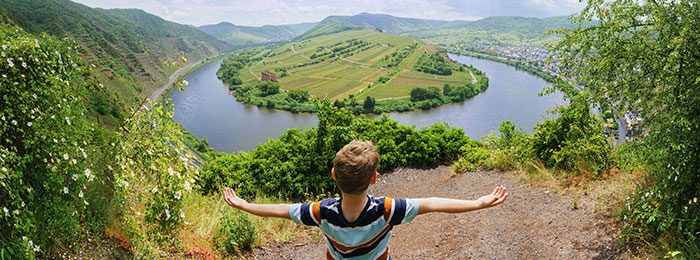
Varied learning opportunities for students
Offering a huge variety of attractions which not only allow students to dive into culture but expand their knowledge of process, history and language, Cologne presents groups with a refreshing blend that will encourage students engagement. Beyond the unmistakable Kölner Dom, Cologne presents school groups with the perfect mix of excursions ranging from chocolate to sports and art to Roman history.
Such attractions sees implicit learning take place. This is when the student is learning without realising. Knowledge is transferred without the formality of a classroom or WALT/WILF goals defining success criteria.
To maximise these opportunities in the Rhineland, school groups have the chance to make their trip a multi-centre experience from Cologne south to Koblenz. Sitting on the banks of the Rhine and Moselle, Koblenz offers a greater insight into how the Rhineland-Palatinate was shaped.
From the 11th-century fortress to “German Corner”, students carry on the timeline from Roman history up to the history of the last 30 years. Tying into the Cold War and the conflict and tension between East and West, the value of the Rhineland suddenly triples as students will be able to understand change and continuity across history, launch a thematic study across eras, and extend knowledge of specified key events in wider world history without British overseas involvement.
History aside, the museums found in the Cologne and Koblenz offer an incredible journey into art, periods and the inspiration behind the masterpieces. Sport and the historical impact of teams like Köln and Mainz 05 highlights the impact on culture, the place of football in society, and how stadia has contributed to enhancing commercial opportunities within the respective cities. Last but not least, language. Cities like Koblenz give students the opportunity to engage with native speakers with a wide array of shops and excursions with friendly faces supporting students with language-based assignments. These opportunities support students with comprehension by placing them in unscripted situations.
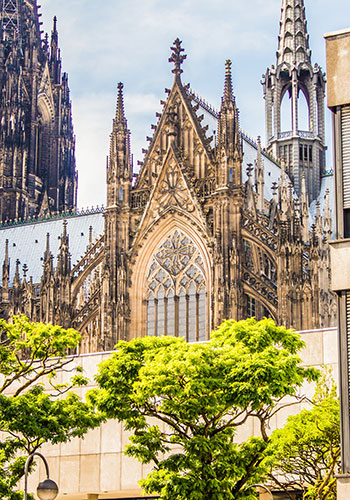
3 must-see attractions in the Rhineland
- Chocolate Museum, Cologne
- Marksburg Castle and Torture Chamber
- Romanticum Koblenz
Chocolate Museum, Cologne
Around 600,000 visitors head for the Chocolate Museum in Cologne every year. It has become the most frequented cultural institution in the city and it’s easy to see why. You don’t have to even be a lover of all things chocolate to find this a fascinating attraction.
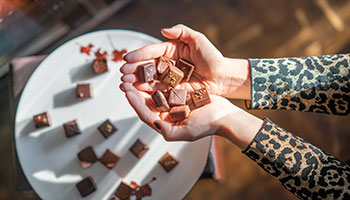
The story of the museum starts in 1972 with the acquisition of a site where Hans Imhoff realised there was an opportunity to make a dream (many of us had as youngsters) a reality… ‘a chocolate museum with a fountain of unending streams of chocolate’. Students will learn how the passionate chocolatier stumbled across a gold mine which would later set him up the new cultural landmark 20 years later at a site perfect to be home to the Chocolate Museum.
However, the story of the museum doesn’t start and end with the entrepreneurial spirit of one man. The story really begins 5,000 years prior to the history of cocoa in the pre-Columbian cultures of Central America. This is where students gain that perfect mix of learning and understanding what connects the history of a product found the other side of the globe with the processes that were used and enhanced to craft chocolate that would become revered and exported.
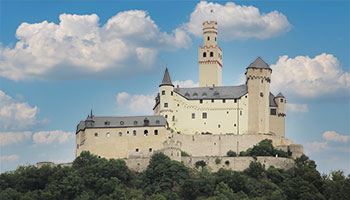
Marksburg Castle and Torture Chamber
There is over 800 years of castle history, but the stories of how the site was used is just part of the beauty school groups will soon see when exploring the Marksburg region. It is the preservation, views and how the castle was located in an optimal location that will really blow away students.
The Marksburg is the only hilltop castle on the Middle Rhine to never have been destroyed.
This is quite a fact considering there are over 20,000 castles dotted around Germany. Arguably more impressive is its complete preservation as a medieval fortification. Students therefore not only get to learn about its position along the Rhine, but take a journey into the Middle Ages with access to the buildings, kennels, bastions, castle kitchen, knight’s hall, Bower, chapel, armoury, wine cellar, battlements and tower room.
To say there is plenty to explore is clearly an understatement with guided tours supporting your students comprehension of Marksburg Castle significance and story of longevity making it a true landmark for the region.
Romanticum Koblenz
When seeking out learning opportunities beyond the classroom you want the content to be inclusive of all your students. The Romanticum allows for that with learning styles considered throughout the exhibitions.
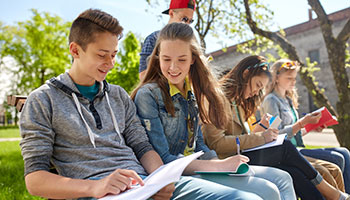
The World Heritage Site is split into five areas with each focusing on a different theme which characterises the Upper Middle Rhine. There are interactive exhibitions galore which allow learning to be focused on self-discovery.
Take the helm and be the captain of the ship as you sail along the Rhine, past the legendary section around the Loreley and onto Koblenz. The huge screens will have students gain a real feel of sailing (minus the wind) and is a great way to learn more about the area.
In the ‘magic of Rhine Romanticism’ area, students will trace the Romantic period. Discovering the inspiration for painters, poets and thinkers, students will discover how the Middle Rhine Valley became a tourist attraction centuries ago due to its outstanding landscape.
Students can also contribute to the exhibition by making their dream castle become a reality. Using the castle easel interactive exhibition, you design and build your castle to sit along the Rhine. The adventure continues with additional elements of the exhibition allowing your school group to take part in the castle hunt activity.
The Romanticum Koblenz successfully brings together interactive activities, informative exhibitions and mini adventures to go beyond understanding the nature and culture of the region. Flora, fauna combined with history and how the Upper Middle Rhine Valley developed due to tourism as well as commerce creates a valuable cross-curricular experience.
Access the Rhineland, access learning
A favourite with schools choosing to travel by coach, the Rhineland’s proximity to the Belgium border means the region is easily accessible. With so much to explore between Cologne and Koblenz, having a coach at your disposal is a huge benefit.
Coach travel also means school groups visiting the Rhineland can take in additional noteworthy locations along the Rhine, including Boppard, Cochem and Bonn.
Where teachers seek a cross-curricular experience for students while maximising the cost/benefit of an educational trip abroad, the Rhineland ticks the boxes. Learning opportunities are as vast as the Rhine River itself with both cities and smaller towns providing students with insight, knowledge and opportunities to self-discover.
To find out more about how Travelbound School Trips can tailor your next educational tour, speak to a member of the team today on 01273 244 572 or contact us here.

Comments are closed here.